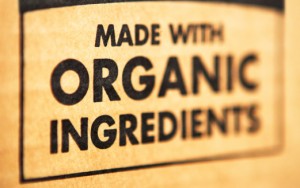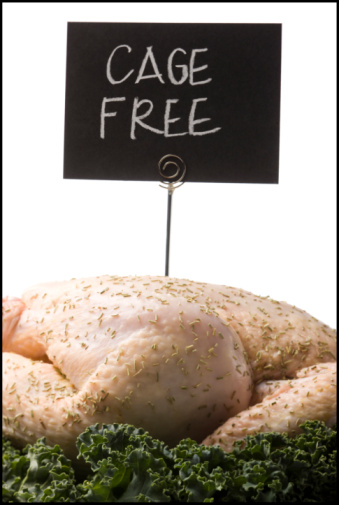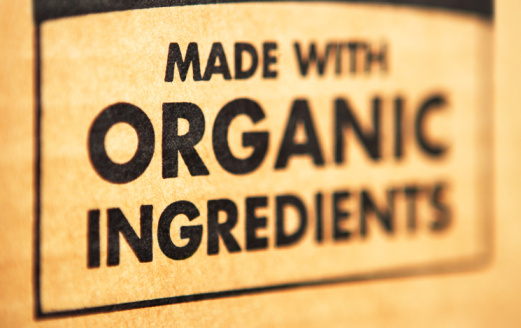 The big companies like Whole Foods, Safeway and even out own Trader’s Joe’s would never skew the truth… or would they? When we are purchasing organic foods, green clothing, and dealing with green businesses, it’s imperative to do research into the suppliers of these items to ensure we’re getting the environmentally friendly products that we think we are.
The big companies like Whole Foods, Safeway and even out own Trader’s Joe’s would never skew the truth… or would they? When we are purchasing organic foods, green clothing, and dealing with green businesses, it’s imperative to do research into the suppliers of these items to ensure we’re getting the environmentally friendly products that we think we are.
Advertisers are in the business to do one thing – sell us a product. And sell they do in a variety of ways, including tricking the consumer – entirely legally. It all comes down to words.
Advertisers have a blast with the organic food market. For example, did you know that the phrase “all natural ingredients” has no legal meaning?
When you check the labels on your food packages, therefore, be aware of what they mean.
• “100 percent organic” means the products are totally organic, or made of all organic ingredients.
• “Organic” means the products that are at least 95 percent organic.
• “Made with organic ingredients” means these are products that have at least 70 percent organic ingredients. The organic seal label can’t be used on these packages.
• “All natural” has no legal meaning at all – zilch.
 What about labels on poultry?
What about labels on poultry?
• “100% organic” means the chicken was raised without antibiotics and hormones. It was NOT fed arsenic, which for some dubious reason is fed to conventional chickens – the type we get in our chicken enchiladas at our local restaurant.
• “Pasture-raised” does not guarantee that a farmer does not use chemicals, it simply means the chickens ate what they found in their pastures, grain, grass, and so on.
• “Free range/cage free” means next to nothing. Unless you’re able to visit a farm and see that the chickens do have such freedom, regard these labels with caution. The USDA has a loophole in their law which allows farmers to “temporarily confine” checkens, meaning that even chicken labeled as “free range” maybe as free as Al Capone in Alcatraz who only saw the light of day from inside his cage.
• “All natural” means no added colorings, artificial flavorings or preservatives are used once the chicken has been harvested, but says nothing about what they were fed prior to that. This is our famous Foster Farms label we see at the stores and on TV screens. They are yet to show an ad how they actually raise those birds.
Labels for beef are similar.
• “USDA Organic Beef” can be fed grass or grain, but they cannot be given growth hormones or antibiotics. Nor can they be fed genetically modified soy or corn. In other words – the way the cow should really be raised.
• “Grass Fed Beef” may eat grass or hay, but no corn or grains. However, they can be given antibiotics and hormones. Strange option. Sort of like deep fried broccoli – the benefit cancels out the unhealthy part.
• Natural Beef – Has no added colorings, artificial flavorings, or preservatives. However, the cow could have fed on a diet of growth hormone, and antibiotics. So much for the “natural”.
And lastly, let’s not forget the cosmetics.
As with any other advertising matter, phrases such as “ botanical” or “natural” or “plant-derived” mean next to nothing. It is only if you see a label that actually says USDA Organic that you know for sure that your cosmetics are organic. The labels follow the same rule as those for food. 100% organic means what it says, Organic means only 95% of the product has to be organic, and Made from organic ingredients – only 70%. I’ve also seen things various veggie powders where the label claims “Contains Organic Spirulina!”, but the rest of 95% ingredients would be non-organic.
Clearly some of the product manufacturers are not as straight with us as they should be. It makes it fun though. When we get educated and start noticing these unwholesome “truths” eventually it all back fires on their reputation anyway. Careful there out friends in the Green industry… We like you but we’re also watching you.
Feel like digging deeper? Check out the GreenerChoices website. There you’ll find out what the labels on your favorite products really mean. You can use their search tools to get the expert evaluation of labels on food, wood, personal care products and household cleaners. You can search by product, category, or certifier, and easily compare labels using our report cards. Enjoy!

 3 Steps to Finance Green Improvements Through Energy Efficient Mortgages (EEMs)
3 Steps to Finance Green Improvements Through Energy Efficient Mortgages (EEMs) How the Danish Island of Samsø Completely Wiped Out its Carbon Footprint
How the Danish Island of Samsø Completely Wiped Out its Carbon Footprint Fake Grass, Synthetic Turf or Stepford Lawns?
Fake Grass, Synthetic Turf or Stepford Lawns?